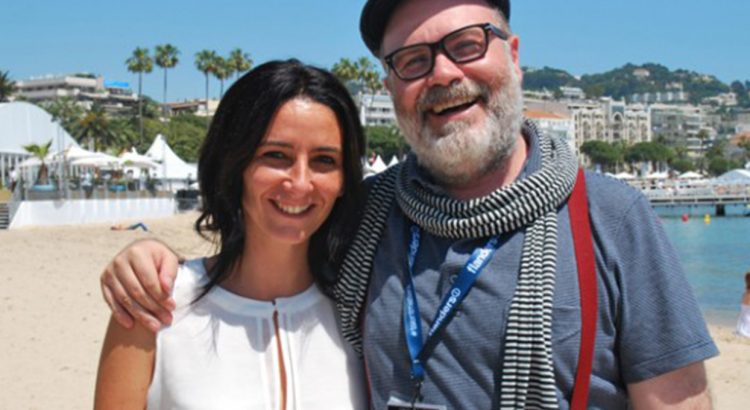We met with the documentary film festival Co-Director Davide Oberto and Managing Director Vanessa Alvarez at the bustling International Village, finding time to discuss the status of documentary films in Cannes, the kind of films they are looking for and the importance of film festivals.
For many a festival programmer, the Cannes Film Festival marks the starting point of the arduous process of scouting films. No surprise then that we find Doclisboa at the prestige festival at the Cote d’Azur. Even before it became a member of DocAlliance in 2013, the Portuguese festival was well-known as a festival dedicated to forward-thinking documentaries, to films that push the genre to a
Jana Dietze, FilmFestivalLife: What do you think about the documentary program in Cannes?
Davide Oberto: Cannes doesn’t have a documentary section, there are some documentaries in every section so we have to check and discover them there. We’re trying to find the films that aren’t just documentaries, but those that are on the border and try to push the genre. We’re more into the experimental documentary, the documentary that plays with styles and languages. In the market you have the chance to see all the films you missed at other festivals and new productions.
Vanessa Alvarez: Due to the high visibility of Doclisboa in recent years, it’s crucial to keep the programming strong. This is why there are three of us here and our main goal is to maintain and exceed the high standard of the last years’ Doclisboa. In Cannes we will receive an overview of the films that have been made this year, because this is also important – to know and understand current filmmaking tendencies.
Do you see any new trends for documentary films?
Davide: The new trend is to mix languages. For us, the most important thing is that we’re considering documentary films. Finally also the big festivals are starting to consider documentaries. It’s a matter of cinematic language, which is great.
What gets a film selected for Doclisboa?
Davide: It has to be a good film! Still, it’s difficult to say as we don’t have a precise scheme for this. It has to have the right language in order to say what it wants to say. Every film has something, and the good part of what we are doing in terms of programming and watching films, is that you have the possibility to be surprised. It’s so nice when a film surprises you!
What are you doing for the selected filmmakers?
Vanessa: We always do Q&A’s after each screening, so it’s important for us to have the director present – particularly for the competition entries. This is a way to meet the director, something Doclisboa has always prioritized. It’s even more important now in the modern landscape to meet the director and work with him.
Davide: We think that is necessary to create spaces where the audience can meet the directors outside of the screenings.
Vanessa: Yes, our audience knows about the lounge, where they can meet the directors in a laid-back way. It’s very well-accepted, the directors like it very much and they can get in contact with other directors too.
Why are film festivals important?
Davide: Cinema is still and should continue to be a collective experience, something we have to support. It’s so nice to watch films with friends and find new friends watching films.
Vanessa: This idea of directors meeting directors and getting other opinions – this is very important for us. Through this, you create new ideas, and new ways of looking at the documentary. And you can find people for the next project. In fact, we’re working on a new project ourselves, but we can’t say anything just yet…
Anyway, we want every selected film to be a part of Doclisboa and we work on the promotion with the local and international journalists.
Davide: When we invite a film to a festival, it’s our film too.
How is your experience of FFL?
Vanessa: We are very pleased with it! It works very well for us – we started off with it as a trial, and every year we are getting more and more into FilmFestivalLife!
Davide: FFL – it’s a growing life!
Anything else?
Vanessa: Doclisboa has grown internationally and it’s considered one of the primary documentary festivals in Europe. It has lots of visibility.
Davide: I think the audience and the directors are starting to know that we have our idea of cinema and we try to make it clear the ideas we have about cinema. In the time of VOD, you can have access to everything but maybe you don’t have the instruments to choose the right direction. One of the duties of a festival is to make a statement about cinema, so you know when you are attending what you will find.
Davide Oberto, Festival Co-Director
Vanessa Alvarez, Managing Director
Doclisboa – International Film Festival
Oct 22 – Nov 01, 2015
Lisbon, Portugal
Submit to Doclisboa on FilmFestivalLife:
Late Deadline: June 15, 2015
More festival stories:
:: Doclisboa about Doc Alliance, Round Tables and Fake Documentaries
:: The Progression of LGBT Cinema and Challenging the Mainstream – Pushing Boundaries with Queer Lisboa
